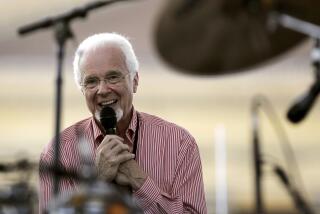Red Norvo; Jazz’s First Xylophone, Marimba Virtuoso
- Share via
Red Norvo, jazz’s first mallet virtuoso on marimba, xylophone and vibraphone, whose delicate sounds graced clubs from Los Angeles’ Westside to Europe for six decades, has died. He was 91.
Norvo, who worked with the Paul Whiteman and Benny Goodman bands and led his own small groups, died Tuesday at the Fireside Convalescent Home in Santa Monica. He had suffered a stroke in 1986 that virtually ended his performing career.
Nearly 30 years ago, the late Times jazz critic Leonard Feather called Norvo “the man who in terms of seniority, wisdom and ingenuity, has long been the Benjamin Franklin of his art.”
“In an age of Aquarius and broken sound barriers,” Feather wrote after a 1970 performance by the Red Norvo Trio in a Sunset Strip hotel, “the quiet creativity of Red Norvo is as benign and soothing to the ear as the sound of falling leaves.”
Feather, who reviewed Norvo’s work from the 1960s into the 1980s, frequently referred to the jazzman as “a true giant of jazz” and once wrote that the mallet master’s style was “as easy to swallow as cotton candy.”
Born Kenneth Norville in Beardstown, Ill., the redheaded youth began playing marimba at the age of 14 and later learned to play xylophone. After working in vaudeville as a teenager, he joined the Paul Ash Orchestra. It was Ash who changed Norville to Norvo--simply by mispronouncing it for a reporter.
Norvo toured with a marimba band in the late 1920s, introducing mallet instruments to jazz a few years before Louis Armstrong persuaded Lionel Hampton to adopt the vibraphone.
In the early 1930s, Norvo played xylophone in Whiteman’s orchestra, where he met and married the band’s singer, Mildred Bailey. Performing together in New York clubs with various small groups they organized, the couple became known as “Mr. and Mrs. Swing.” Among their hits of the 1930s were “Rockin’ Chair,” “Please Be Kind” and “Have You Forgotten So Soon?”
Norvo began recording in 1933 as a solo xylophonist with his popular “In a Mist” and leading his groups on “Knockin’ on Wood” and “Hole in the Wall.” He was still making albums half a century later with “Vibes a la Red” in 1974 and “Swing Reunion” in 1985.
He joined Goodman’s sextet in 1944 and switched permanently to the vibraphone. But Norvo played the instrument without vibrato or, as Feather wrote decades later, “with the motor turned off, and [he] is never likely to be classified as one of the amplification generation.”
Norvo worked with Woody Herman, toured with Billie Holiday, and played swing and bop with Charlie Parker, Dizzy Gillespie and Teddy Wilson. He organized a renowned West Coast jazz ensemble with Tal Farlow and Charles Mingus in the 1950s.
After his marriage to Bailey ended in 1945 (she died in 1951), Norvo was based in Santa Monica. From there he played clubs in California and Nevada and went on a number of European tours, once with Goodman and another with George Wein’s Newport All Stars.
Norvo appeared frequently in Las Vegas, often at the Tropicana or Sands, where he worked with singer Frank Sinatra. He also toured with Sinatra and appeared with him on television.
Amazingly to other musicians, Norvo often performed despite a hearing handicap. The problem became so pronounced during a Palm Springs appearance in 1968 that he suddenly found himself playing “I Concentrate on You” in the key of D while the rest of the group was playing in E-flat.
“I realized I actually couldn’t hear what the band was playing. I got off the bandstand and went home to Santa Monica,” he told The Times later that year. “It was frightening. I didn’t play another note for four months.”
The problem was caused by lesions from a mastoid infection Norvo suffered as a child that prevented proper sound vibration in his ears. A series of operations improved the condition enough to enable him to continue playing.
Norvo’s second wife, Eve Rogers, died in 1992.
He is survived by his daughter, Portia, and a grandson, Aaron Corlin.
More to Read
The biggest entertainment stories
Get our big stories about Hollywood, film, television, music, arts, culture and more right in your inbox as soon as they publish.
You may occasionally receive promotional content from the Los Angeles Times.








